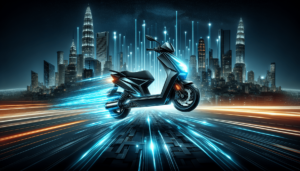
Are you in the market for a scooter but not sure whether to go the electric or gas route? Look no further! In this article, we will explore the pros and cons of both electric and gas scooters, helping you make an informed decision. From cost-efficiency to environmental impact, we’ve got you covered on all the important factors to consider. So sit back, relax, and let us guide you towards choosing the right scooter for your needs.

This image is property of images.unsplash.com.
Check out our product reviews!
Cost
Initial cost
When it comes to the initial cost, electric scooters tend to have a higher price tag compared to gas scooters. This is mainly due to the cost of the batteries and electric components that power the scooter. However, it is important to consider the long-term savings that electric scooters can offer. With the rising cost of gasoline and the increasing efficiency of electric scooters, the higher initial cost can be offset by the savings in fuel expenses over time.
Operating cost
When it comes to operating costs, electric scooters have a significant advantage over gas scooters. Electric scooters can be charged using standard electrical outlets, which are more readily available compared to gas stations. The cost of electricity is also generally lower compared to gasoline, resulting in lower fuel expenses for electric scooters. Additionally, electric scooters require less maintenance and have fewer moving parts, reducing the need for costly repairs or replacements.
Environmental Impact
Emissions
One of the key advantages of electric scooters is their minimal to zero emissions. Unlike gas scooters, which release harmful pollutants such as carbon monoxide and nitrogen oxides, electric scooters produce no tailpipe emissions. This not only helps to improve air quality, but also reduces greenhouse gas emissions, contributing to a cleaner and healthier environment.
Noise pollution
Another environmental benefit of electric scooters is their reduced noise pollution. Gas scooters, with their internal combustion engines, can be quite noisy and contribute to the overall noise pollution in urban areas. On the other hand, electric scooters operate quietly, minimizing noise disturbances for both riders and pedestrians. This can lead to a more peaceful and enjoyable riding experience, especially in densely populated areas.

This image is property of images.unsplash.com.
Check out our product reviews!
Performance
Acceleration
When it comes to acceleration, electric scooters have a clear advantage over gas scooters. Electric motors deliver instant torque, providing quick and smooth acceleration from a standstill. This makes electric scooters highly responsive and ideal for navigating through city traffic or making quick maneuvers. Gas scooters, while still capable of decent acceleration, may experience slight delays as the engine builds up power.
Top speed
In terms of top speed, gas scooters tend to have a higher potential compared to electric scooters. Gas-powered engines offer greater horsepower and torque, allowing for higher top speeds. However, it is important to note that most urban areas have speed limits that are well within the capabilities of both electric and gas scooters. Unless you specifically require high top speeds for long-distance travel, the difference in top speed may not be a significant factor in your decision-making process.
Range
Range refers to the distance a scooter can travel on a full charge or tank of fuel. Electric scooters typically have a more limited range compared to gas scooters. While advancements in battery technology have extended the range of electric scooters in recent years, gas scooters still have the advantage of refueling quickly and easily. However, for daily commuting or shorter trips, the range of electric scooters is more than sufficient. Additionally, the availability of charging stations and the ability to charge at home can help alleviate any concerns about range limitations.
Maintenance
Simplicity
When it comes to maintenance, electric scooters have a clear advantage in terms of simplicity. Electric scooters have fewer moving parts compared to gas scooters, which require regular maintenance and servicing of their internal combustion engines. Electric scooters have fewer components that can wear out or malfunction, reducing the need for frequent repairs or replacements. This not only saves you money in the long run but also saves you time and hassle by minimizing the maintenance requirements of your scooter.
Tuning
Gas scooters have traditionally been favored by individuals who enjoy tuning and customizing their vehicles. Gas-powered engines offer more room for modifications and performance upgrades, allowing riders to fine-tune their scooters to suit their preferences. Electric scooters, on the other hand, have limited opportunities for tuning due to their simplified design and reliance on battery power. However, advancements in electric scooter technology may offer more customization options in the future, catering to those who enjoy personalizing their vehicles.

This image is property of images.unsplash.com.
Convenience
Charging time
Charging time is an important consideration for electric scooters. Depending on the battery capacity and charging method, it can take several hours to fully charge an electric scooter. However, advancements in charging technology have reduced charging times, and there are now options such as fast charging stations that can considerably shorten the time required. It is also worth noting that electric scooters can be conveniently charged at home or at various public charging stations, eliminating the need for frequent trips to gas stations.
Refueling time
Gas scooters have the advantage of quick refueling times. With a gas scooter, all you need to do is fill up the tank at a gas station, which usually takes just a few minutes. This allows for greater flexibility when it comes to long-distance travel, as you can easily refuel and continue your journey without significant delays. However, it is important to consider the availability of gas stations, especially in areas where they may be limited. With electric scooters, you can rely on the growing network of charging stations or charge at home for added convenience.
Infrastructure
Infrastructure plays a crucial role in the convenience of owning and operating a scooter, whether it is electric or gas-powered. Gas scooters benefit from the extensive network of gas stations, allowing for easy access to fuel across various locations. On the other hand, electric scooters rely on charging infrastructure, which is expanding rapidly in many regions. The presence of charging stations in urban areas and along travel routes is constantly improving, making it increasingly convenient to own an electric scooter. Additionally, the ability to charge at home further enhances the convenience factor for electric scooters.
Lifespan
Battery lifespan
Battery lifespan is an important consideration for electric scooters. Over time, the capacity and performance of electric scooter batteries may degrade. However, advancements in battery technology have significantly improved the lifespan of electric scooter batteries. With proper care and maintenance, modern electric scooter batteries can last for several years before needing replacement. It is worth noting that battery lifespan can vary depending on usage, charging habits, and environmental conditions.
Engine lifespan
Gas scooters typically have longer engine lifespans compared to electric scooters. With regular maintenance and proper care, a gas scooter engine can last for many years. Gas engines are known for their durability and reliability, making them a popular choice for riders who prioritize longevity. On the other hand, electric scooter motors are generally simpler and have fewer components that can wear out or malfunction, potentially contributing to a longer lifespan.
Safety
Stability
Both electric and gas scooters can offer a stable and safe riding experience. However, electric scooters may have an advantage in terms of stability due to their lower center of gravity. Electric scooters typically have their batteries positioned low in the scooter’s frame, resulting in better weight distribution and improved stability. Additionally, some electric scooters come with features such as anti-lock braking systems and stability control, further enhancing safety during rides.
Braking
Braking performance is crucial for safe scooter riding. Both electric and gas scooters can be equipped with reliable braking systems. Electric scooters often utilize regenerative braking, which uses the motor to slow down and recharge the battery. This can provide smoother and more controlled braking. Gas scooters typically have mechanical braking systems, which are also effective when properly maintained. Ultimately, the braking performance of a scooter depends on the quality of the braking components and the rider’s skill in utilizing them effectively.
Legal Considerations
Licensing requirements
Licensing requirements for riding scooters, whether electric or gas-powered, vary depending on the jurisdiction. It is important to familiarize yourself with the specific regulations and requirements in your area. In some regions, certain classes of electric scooters may not require a license to operate, while gas scooters typically require a valid driver’s license. It is crucial to comply with all licensing requirements to ensure legal and safe scooter riding.
Restrictions
Certain areas have restrictions or regulations that may affect the use of electric or gas scooters. For example, some cities have implemented specific rules for electric scooter sharing programs, limiting their usage in certain areas or imposing speed restrictions. Gas scooters may also face restrictions in terms of noise and emissions in certain regions. It is essential to be aware of any restrictions that may apply to your scooter and to ride responsibly within the boundaries set by local authorities.
Personal Preference
Noise level
Noise level can be a matter of personal preference when it comes to scooter riding. Gas scooters, with their internal combustion engines, tend to produce more noise compared to electric scooters. Some riders enjoy the sound and feel of a traditional gas scooter engine, while others prefer the quiet and smooth operation of electric scooters. Ultimately, personal preference will determine whether you prioritize a quieter ride or enjoy the audible presence of a gas scooter.
Driving experience
The driving experience is another factor influenced by personal preference. Gas scooters offer a more traditional and familiar experience with the sound and vibration of an internal combustion engine. This can provide a sense of nostalgia and excitement for some riders. On the other hand, electric scooters offer a quiet and smooth ride, with instant acceleration and minimal vibrations. The driving experience of an electric scooter can be described as effortless and serene. Choosing between the two depends on your individual preferences and what type of riding experience you prefer.
Availability
Market options
The availability of electric scooters has been steadily increasing in recent years. More manufacturers are entering the market, offering a wide range of electric scooter models with varying features and specifications. This allows riders to choose from a diverse selection based on their needs and preferences. Gas scooters have a well-established market and have been widely available for a long time. However, the growing demand for electric scooters has prompted manufacturers to expand their offerings, providing consumers with more options to choose from.
Service centers
Service centers play a crucial role in the ownership of both electric and gas scooters. Gas scooters have an advantage in terms of established service networks, as they have been in circulation for a longer time. Finding a service center for routine maintenance, repairs, or parts replacement is generally easier for gas scooters. Electric scooters, while increasingly popular, may still have a more limited number of dedicated service centers depending on the region. However, as the demand for electric scooters continues to grow, service centers are expanding their expertise and services to accommodate electric scooter owners.
In conclusion, when deciding between electric and gas scooters, it is important to consider factors such as cost, environmental impact, performance, maintenance, convenience, lifespan, safety, legal considerations, personal preference, and availability. Electric scooters offer advantages in terms of reduced emissions, lower operating costs, quieter operation, and ease of maintenance. Gas scooters, on the other hand, offer advantages in terms of higher top speeds, longer engine lifespans, and quick refueling times. Ultimately, the choice between electric and gas scooters depends on your specific needs, preferences, and the considerations outlined in this article.



